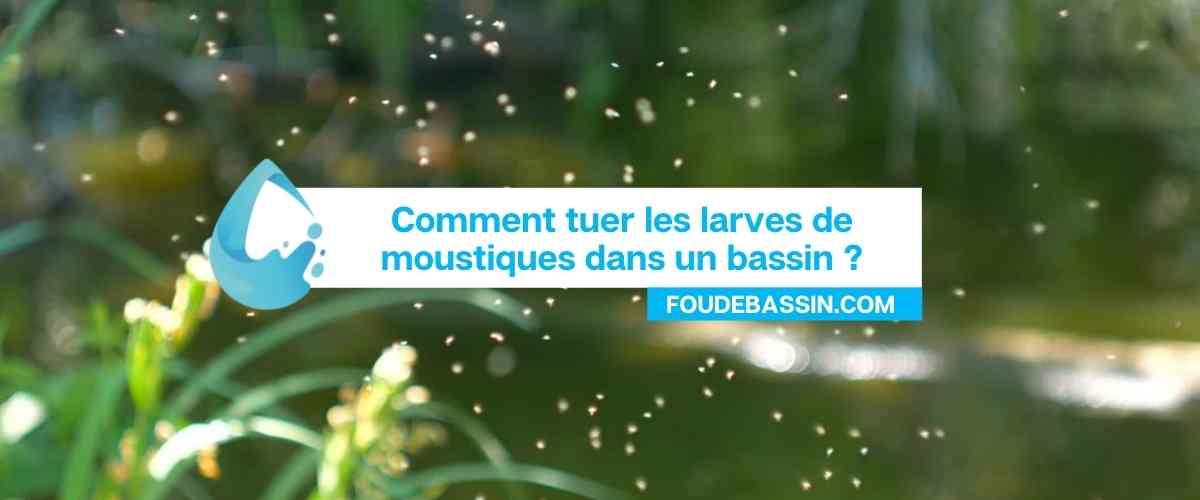Retrouvez ici les indispensables et meilleures ventes pour nos propriétaires de bassin.
Retrouvez ici les indispensables et meilleures ventes pour nos propriétaires de bassin.

How to kill mosquito larvae in a pond?
Mosquitoes lay their eggs in standing water such as ponds or garden ponds. When these eggs hatch, they become larvae. From then on, these larvae develop and quickly turn into hungry adult mosquitoes that invade your home. So, to prevent this phenomenon from happening and protect yourself from many mosquito bites, follow our advice!
A pond is undeniably a charming asset in a garden. But when mosquitoes settle there, your watering hole can turn into your worst nightmare... Fortunately, these 7 techniques will help you kill mosquito larvae in a pond (and prevent their appearance).
Mosquito eggs do not survive in water with current like that of a river or river. Therefore, your pond is the perfect breeding ground for mosquitoes. To prevent the appearance of larvae, add an air pump or a fountain to create movement in the water.
You can choose the volume of your pool on the page of our complete aeration kits (see filter on the left) . For any questions, we remain at your disposal.
When mosquito larvae are hatching, they need food to stimulate their growth. For this, nothing better than the thick layers of algae present on the surface of the water.
![]() Discover our guide to limiting algae right here > here <
Discover our guide to limiting algae right here > here < ![]()
Mosquitoes love it. By eliminating this food source , you will keep mosquitoes away and make your pond more aesthetic. To get rid of green algae, see our dedicated article on this subject.
To keep your pond ecosystem in balance, add some mosquito-eating fish. Gambusia, for example, is known to feed on mosquito larvae, water fleas and worms. Goldfish, very easy to obtain in pet stores, are also excellent hunters of mosquito larvae.
Here is a list of mosquito-eating fish :
If you have tried various natural techniques, but mosquito larvae are still proliferating in your pond, use a mosquito repellent to use on plants out of water + rinse well before . Much less harmful to your tadpoles and fish than chemical insecticides, a specialized insecticide will ensure the proper development of your species.
You can use LERNEX to treat pond mosquitoes.
Adult mosquitoes thrive in areas of moist, lush vegetation that often surround ponds and watering holes. If you maintain your pond with care, mosquitoes will be less likely to settle there and lay eggs .
Be sure to regularly cut the vegetation around your pond, remove weeds and uproot dead plants.
Fish are not the only mosquito hunters. Bats, dragonflies and other animals also eat baby mosquitoes.
If you create a welcoming habitat for these animal species in your garden, they will be more likely to wage war on mosquito populations.
Your pond may be a prime breeding ground for mosquitoes, but chances are they've also found refuge in other areas of your property, or even your neighbors.
Do not hesitate to discuss it with them to find out if they encounter the same problem as you. If so, try to act together to encourage the mosquitoes to decamp and go and lay their eggs in another neighborhood!
As you will have understood, there are more or less natural techniques for killing mosquito larvae in a pond . That said, we advise you to bet on a fountain to avoid stagnant water and on small fish that eat larvae (ideas melanotes) .
Of course, don't forget to maintain your pond regularly. And to learn how to maintain your garden pond, do not hesitate to consult our dedicated article on this subject!
Aquipond Greenstab - Natural treatment against pond algae It is a natural product that helps limit algae at any time. It also has a prevent...
View full detailsReduces the layer of silt in the pond by at least 40% Easy to use with less impact on biodiversity Prevents fermentation, bad odors. pH ...
View full detailsOrganic dye to block plant growth by limiting photosynthesis ORGANIC PRODUCT NON TOXIC TO HUMANS (DIVING) AND FISH. 100% NATURAL AND BIODE...
View full detailsThe positive effects of barley straw have been known to water enthusiasts for a long time. But currently barley straw is difficult to find and i...
View full detailsReduces at least 40% of the layer of silt in the pond Easy to use with less impact on biodiversity Prevents fermentation, bad odors. ...
View full details
Leave a comment